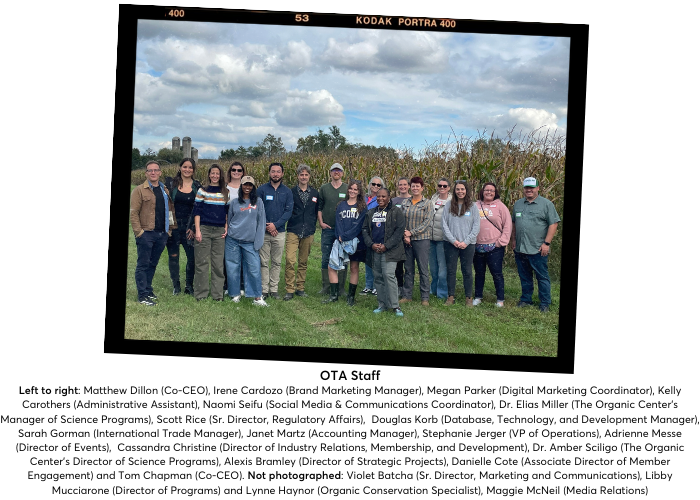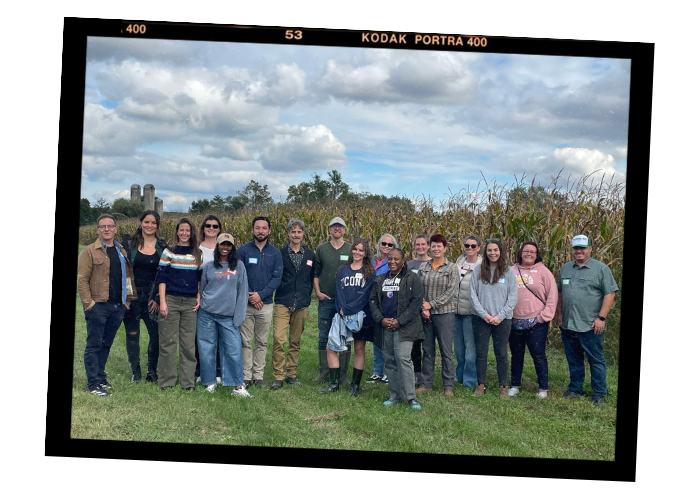
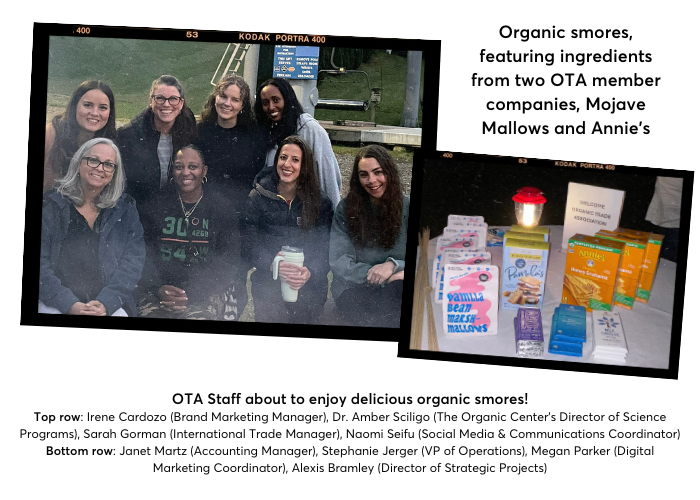 Day one – Bear Creek Resort
Day one – Bear Creek Resort
On September 30, our Organic Trade Association (OTA) employees trickled in from across the United States to the rolling hills of Lehigh Valley, Pennsylvania, for a staff retreat. It was a week filled with farm tours and team building activities and offered a chance for longtime coworkers to clock facetime with each other and new employees to meet the team in-person.
The trip began with organic smores, featuring ingredients from two OTA member companies, Mojave Mallows and Annie’s, around a campfire.
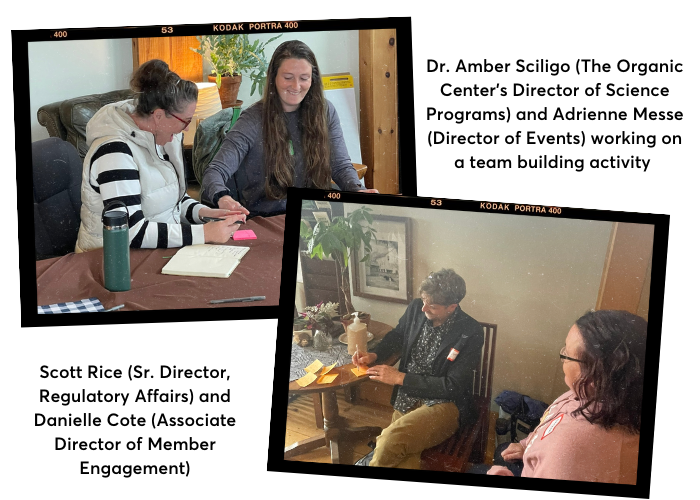 Day two – Rodale Institute Headquarters
Day two – Rodale Institute Headquarters
On day two, we piled into cars to drive out to Kutztown to the 386-acre certified organic farm where Rodale Institute Headquarters is housed for a morning of facilitated team building activities. The Rodale Institute Headquarters is the site of its Farming Systems Trial, Vegetable Systems Trial and hemp research, and includes labs, classrooms and a pastured hog facility.
OTA staff had a surprise visit from longtime organic farmer and OTA’s newest board member, Luke Howard, who recently started working at the Rodale Institute.
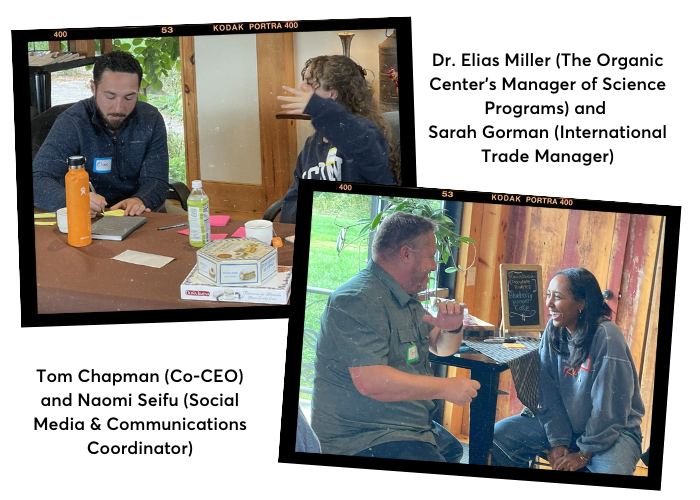 After a catered lunch by Old School Sandwich Company with a choice of blueberry cheesecake or flourless chocolate cake for dessert, we piled into a wagon ride (minus the hay) for a guided tour of the grounds with Dr. Andrew Smith, PhD, Rodale Institute’s Chief Scientific Officer. We drove by the former site of an orchard planted that was part of a project with Cornell and Rutgers Universities and learned about organic apple research.
After a catered lunch by Old School Sandwich Company with a choice of blueberry cheesecake or flourless chocolate cake for dessert, we piled into a wagon ride (minus the hay) for a guided tour of the grounds with Dr. Andrew Smith, PhD, Rodale Institute’s Chief Scientific Officer. We drove by the former site of an orchard planted that was part of a project with Cornell and Rutgers Universities and learned about organic apple research.
Next, we hopped off the wagon at Rodale’s pastured hog facility to learn about pasture-raised pigs and meet Matilda who—like the other pigs onsite—is able to roam freely 24 hours a day, seven days a week from pen to pasture to graze to his heart’s desire. Rodale research technician Sara Major gave employees information on grazing habits and hog pasture rotation and spoke on some of the challenges the Pasturized Hog Facility faces. “A big issue is getting funding and getting all the resources that we need,” said Major.
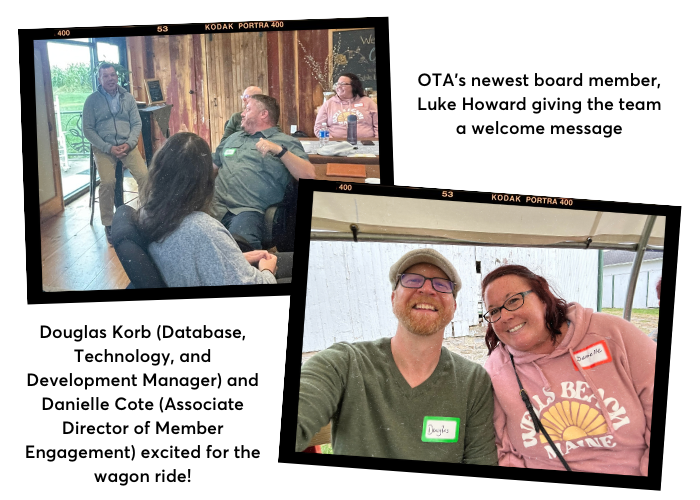 Dr. Smith also gave us an overview of Rodale Institute’s immersive Farmer Training Program, “We have about 20 students that come every year,” said Dr. Smith. “They actually live in Kutztown now because the two houses we have on the property can’t hold everyone. Most are research interns or other interns. The Farming Trainer goes from March to November, so you get an entire season of learning how to be a farmer and it’s really tailored to people who have never farmed before.”
Dr. Smith also gave us an overview of Rodale Institute’s immersive Farmer Training Program, “We have about 20 students that come every year,” said Dr. Smith. “They actually live in Kutztown now because the two houses we have on the property can’t hold everyone. Most are research interns or other interns. The Farming Trainer goes from March to November, so you get an entire season of learning how to be a farmer and it’s really tailored to people who have never farmed before.”
Later on the tour, standing scattered among cabbage and carrots, OTA staff listened to Research Associate Roman Caetani, who pointed out to us that it’s apparent even at first glance that organic soil is healthier. “We usually plough both fields at the same time—both conventional and organic. You can clearly see that the organic soil is much darker,” said Caetani.
Day three – Wild Fox Farm and Rodale Institute
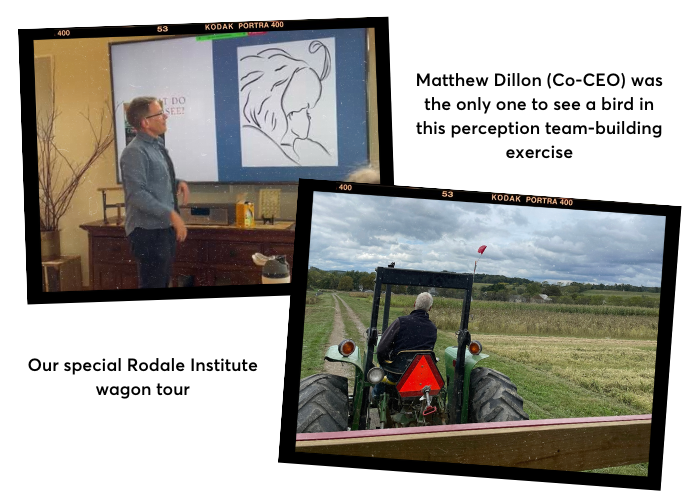 On the third day, we headed out to Wild Fox Farm in Barto, owned and run by Ben and Karah Davies for the last 15 years in Berks County, Pennsylvania. Wild Fox Farm has farmed everything from pastured eggs and chicken, grass fed lamb and beef, pastured pork, and over 30 varieties of vegetables, to hazelnuts, oats, rye, hay and hemp. They also own a hemp and CBD supplements company called Wild Fox Provisions.
On the third day, we headed out to Wild Fox Farm in Barto, owned and run by Ben and Karah Davies for the last 15 years in Berks County, Pennsylvania. Wild Fox Farm has farmed everything from pastured eggs and chicken, grass fed lamb and beef, pastured pork, and over 30 varieties of vegetables, to hazelnuts, oats, rye, hay and hemp. They also own a hemp and CBD supplements company called Wild Fox Provisions.
Ben, who went to university for a master’s degree in philosophy, did not originally intend to become a farmer, and quickly became uniquely aware of some of the challenges organic farmers face, including farm staff retention issues, which he said is in some part caused by “eager millennials romanticizing organic farm life.” Another challenge that Ben said his farm faces is shrinking profit margins due to fewer people buying from the farmer’s market in the current economy.
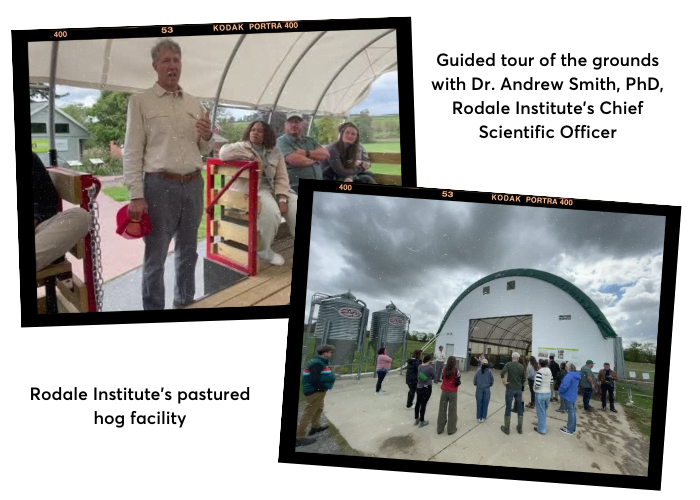 Weaving around cow patties with the smell of hemp plants wafting through the air, the team was able to head into the cow pen to pet some of the cattle and snap some photos. Wild Fox Vegetable Production Manager Rachel Davidson spoke to us about everything from food justice and accessibility, to reducing plastic consumption and organic pest control methods.
Weaving around cow patties with the smell of hemp plants wafting through the air, the team was able to head into the cow pen to pet some of the cattle and snap some photos. Wild Fox Vegetable Production Manager Rachel Davidson spoke to us about everything from food justice and accessibility, to reducing plastic consumption and organic pest control methods.
“A lot of people who don’t have access to fresh healthy food are also the people who exist in heat islands where there’s no trees in their neighborhood and it’s 5-10 degrees hotter there than neighborhoods that have more parks and trees,” Rachel noted.
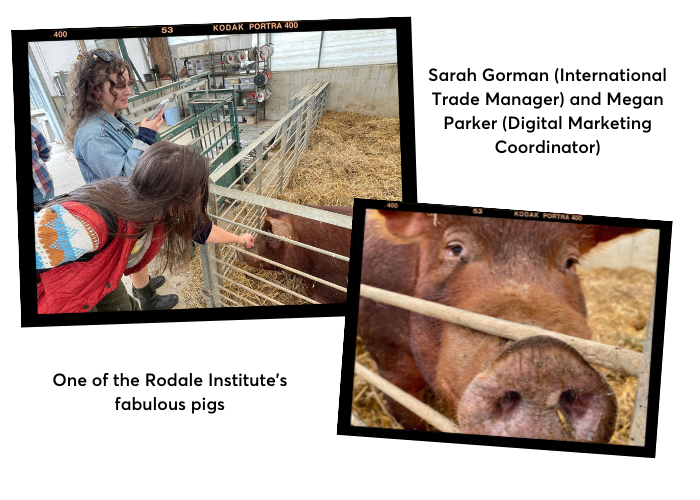 Her most effective organic pest control method is quite simple. She said nylon “insect netting is an absolute must” for organic farming at Wild Fox Farm. “Row covers are our biggest defense. And the deer are the worst—that’s why we use this bird netting.”
Her most effective organic pest control method is quite simple. She said nylon “insect netting is an absolute must” for organic farming at Wild Fox Farm. “Row covers are our biggest defense. And the deer are the worst—that’s why we use this bird netting.”
When The Organic Center’s Director of Science Programs Dr. Amber Sciligo asked about plastic use on farms, she said even organic farmers who want to reduce plastic on their farms are faced with the practicality of cost: “A lot of irrigation [material] is really cheap [plastic] pieces that you buy for 10 cents to be easily replaceable,” says Rachel. “There’s a lot of barriers especially for small farmers being able to afford higher quality—maybe metal—attachment pieces that might be more than a dollar a piece themselves and you need dozens or hundreds of them, depending on their operation.”
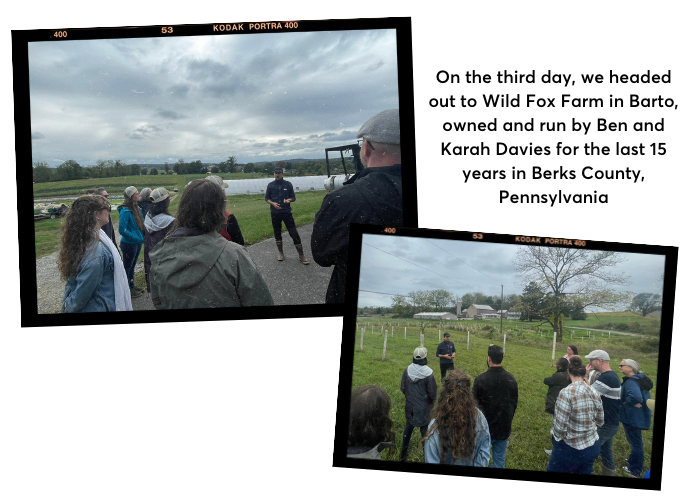 Rachel said she sees farmers trying innovative methods for sustainability—both environmentally and financially. “I have seen people go and buy an old billboard vinyl for 50 bucks. And those are actually huge,” she says of some ways to reduce disposable plastic silage.
Rachel said she sees farmers trying innovative methods for sustainability—both environmentally and financially. “I have seen people go and buy an old billboard vinyl for 50 bucks. And those are actually huge,” she says of some ways to reduce disposable plastic silage.
Day four – FarmerJawn
On departure day, some of us were able to squeeze one last farm trip into our retreat before our planes and train rides home. We headed out to FarmerJawn, a sprawling 128-acre working farm and CSA that enables regenerative organic food production by and for underserved communities. FarmerJawn offers an Agriculture Business Incubator, School-Based Programming for local schools and Community Classes that are hosted at their Greenery.
 It is also the largest black woman-owned farm in Pennsylvania. We were greeted by Christa Barfield, farm founder, CEO, and recent recipient of a James Beard Leadership Award. We wind our way past the teeming compost mound and through the fields to see chicken pens and rows of flower gardens run by members of the local community. Barfield said hosting Black and Brown farmers on the farm helped realize her dream of expanding food equity by supporting underserved communities: “It allowed me to do what I wanted to do, which is giving opportunities to Black and Brown farmers,” she says. She also offered some insight on organic consumer lifestyles and consumer perception of CSAs:
It is also the largest black woman-owned farm in Pennsylvania. We were greeted by Christa Barfield, farm founder, CEO, and recent recipient of a James Beard Leadership Award. We wind our way past the teeming compost mound and through the fields to see chicken pens and rows of flower gardens run by members of the local community. Barfield said hosting Black and Brown farmers on the farm helped realize her dream of expanding food equity by supporting underserved communities: “It allowed me to do what I wanted to do, which is giving opportunities to Black and Brown farmers,” she says. She also offered some insight on organic consumer lifestyles and consumer perception of CSAs:
“…The education on CSA and what it means to be a CSA member is difficult for people to understand that they’re really investing in the farm as well as getting produce weekly instead of just going to the grocery store. It’s hard, it’s a rewiring of our thoughts, of everything we’ve ever known. So, I understand it. That’s the most difficult part of educating the customer.”
After the tour, we perused the on-site shop, and staff picked up some items such as quinoa, matcha tea and fresh flowers before heading to the train station and airport to head home. We received a lot of information to unpack during the trip, seeing firsthand both the daily and overarching challenges that organic farmers and scientists face.
On the flip side, it was also clear that the benefits to human and environmental health—both now and for future generations—are abundant. A quote from Barfield in video on FarmerJawn’s website says it best: “Let’s allow the soil and the earth to heal, so that it can take care of the us the way it was originally intended to.” Sounds like there’s no greater work to us.
